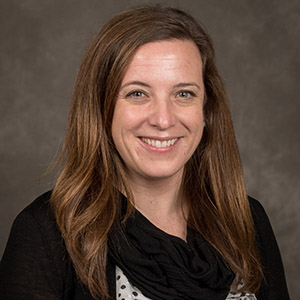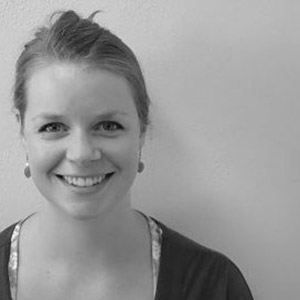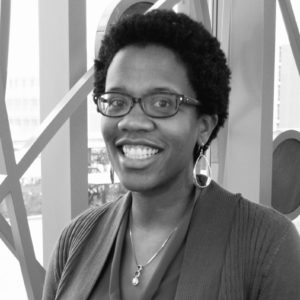UW’s Prenatal to Five Initiative advances early childhood solutions in Wisconsin
From February through June, we will highlight the ways that UW–Madison powers the state’s economy through research and innovation, educates the next generation and reaches out to Wisconsinites to improve their lives. May’s theme is Education. Watch for more at #CantStopABadger and #UWimpact on social media. Your support can help us continue this work.
Policymakers at state and national levels are taking on the childcare issue in a serious way, urged in no small part by the pressures the pandemic exposed for working parents and caregivers.

Amy Meinen
“Families in Wisconsin pay anywhere from 13 to 34 percent of their incomes, on average, for childcare, if they can find an available slot in the first place,” says Amy Meinen, co-director of the Prenatal to Five Initiative (P25) at the University of Wisconsin–Madison.
She also notes that childcare professionals earn an average of $22,630 annually, or just more than the federal poverty level for a family of three, even while they’re expected to afford certain levels of increasingly expensive education and certifications.
“So there’s a squeeze on both sides of the system that simply isn’t sustainable or equitable for families, kids, or childcare professionals.”
The COVID-19 pandemic set into stark relief the value of the childcare industry. Yet public health safeguards posed special challenges to childcare centers, which largely operate privately and could not access the same avenues of PPE and food supplies as K-12 public school systems.

Amy Korth
“We were hearing real desperation from some of our partners. At the beginning of the pandemic, the Wisconsin Grocers Association partnered with us to address availability challenges of certain foods needed for meals and snacks that providers were having trouble finding in stores,” says Amy Korth, P25 co-director. “It’s these deep connections we’ve cultivated through the P25 network, as well as through healthTIDE and Healthy Early efforts, that made the difference when it mattered.”
The Prenatal to Five Initiative, housed in the School of Human Ecology (SoHE), began as a mechanism “for the university to step into this early lifespan space and do our part,” explains Janean Dilworth-Bart, the Phyllis Northway Faculty Fellow with P25 and Professor of Human Development and Family Studies in the School of Human Ecology.
In 2017, P25 hosted Wisconsin’s first ever prenatal-to-five focused summit to connect researchers, childcare professionals, policymakers, and community leaders on early childhood care and education opportunities.

Janean Dilworth-Bart
The following year, the group convened the Wisconsin Early Care and Education Legislative Symposium, deepening university and state lawmaker collaboration on the issue. In 2019, P25 researchers facilitated a series of regional meetings across Wisconsin between early childhood issue stakeholders to discuss their priorities.
They were busy synthesizing the groups’ conversations when COVID-19 began, and later in 2020, national protests around police violence and systemic racism. Thanks to the cross-sector network of groups P25 had cultivated, its leadership could reconnect quickly with regional contacts to learn the real-time impacts and needs for childcare professionals, families, and kids.
“Providers have had to fight to get noticed in terms of being frontline and essential,” says Meinen. “There was a big effort last summer to get PPE into schools, and early care wasn’t in the initial mix of receiving supplies. However, these people are so resourceful, they developed their own solutions through innovative purchasing models for things like food and sanitizer and cleaning products…. They’d do anything for the kids in their care, and they are heroes.”
Earlier this month, P25, along with the UW Center for the Humanities and Wisconsin-based advocacy group Kids Forward, co-hosted a virtual roundtable discussion featuring childcare professionals describing their work first-hand, including during the pandemic. State Sen. LaTonya Johnson and Dilworth-Bart introduced the event, highlighting opportunities in the state budget to better support these professionals and the families who depend on them.
“What we heard was of course many of the challenges they were facing — the PPE and food shortages with COVID, but more generally, that they’re underpaid and not fully respected as true professionals,” says Dilworth-Bart. “But they are highly skilled and dedicated professionals, mainly women, whom we trust every day with our kids. Even in the midst of a challenging year, it has been amazing to see what they’ve accomplished.”
P25 and SoHE are also working with the Wisconsin Department of Health Services Maternal Child Health Program to identify the needs of families. Throughout 2021, P25 and MCH will conduct surveys and convene community conversations that center the knowledge and lived experiences of Wisconsinites most impacted by COVID-19 and racial disparities. Parents, families, and caregivers are invited to share both impediments and aids to their children’s health and wellbeing, which in turn will inform future engagement and research.
“Over and over, providers have told us how they miss ‘their kids,’” Korth adds, describing her hope that society has a new appreciation for childcare professionals. “They talk about their work as more than a job; it’s a calling…. They are so innovative and always under-resourced, and I’m excited for how P25 can leverage university resources and relationships to amplify their exceptional impacts.”
The Prenatal to Five Initiative (P25) is administratively housed in the Center for Community and Nonprofit Studies (“the CommNS”) in the School of Human Ecology at UW–Madison. Learn more about their work and see the issue brief developed for policymakers.
UW–Madison contributes $20.8 billion per year to the Wisconsin economy, and UW–Madison related start-ups contribute an additional $10 billion. Read more here.
Subscribe to Wisconsin Ideas
Want more stories of the Wisconsin Idea in action? Sign-up for our monthly e-newsletter highlighting how Badgers are taking their education and research beyond the boundaries of the classroom to improve lives.




